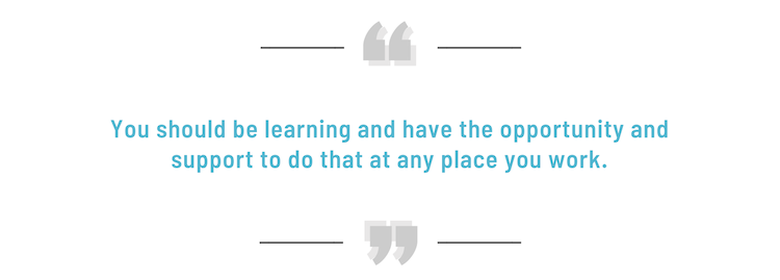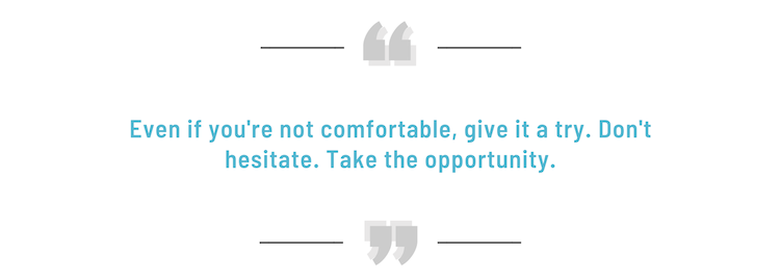
There’s an issue in the tech industry, and it’s one we’ve known about for quite some time. While many tech companies are trying to increase their female workforce, a majority of them still have a shockingly low number of women among their ranks.
In fact, a recent report showed that among major tech companies, only 26-43% of their workforce is female. And in Silicon Valley, women hold just 11% of the executive positions.
We spoke with Kelly Sheng, Associate Director of Technology at AT&T, about how women can excel in this male-dominated field and what they should look for in a job in tech.
Timing Is Everything, But So Is Hard Work
Success is dependent upon talent and hard work, but as Malcolm Gladwell said in Outliers, timing definitely helps. And that’s certainly true for Kelly—growing up in Shanghai throughout the 1980s and 90s, she had access to a computer. Today, this might not sound like a big deal, but 25 years ago, it was.
“I was fortunate enough to get access to an afterschool program that teaches young kids in elementary school computer programming,” Kelly says. This was a luxury and a privilege, as none of her friends had PCs, nor did her family have a home computer. “At that time, it was rare. There were maybe just one or two programs in a few cities in China.” It was an eye-opening experience for Kelly, and she continued working with computers throughout elementary and high school.
In addition to fortunate timing, Kelly also put in the time, and it led her to UCLA where she got her Masters in Computer Science.
Today, Kelly leads the Capacity Planning team and the Technical Vendor Management team at AT&T. She’s responsible for determining the company’s production capacity for their streaming platforms, or in layman’s terms, she's making sure that your DIRECTV doesn’t crash when you’re watching football on Sunday (or The Bachelor).
Curiosity and Confidence Are Key
Kelly started as a developer in software engineering, but she’s changed roles multiple times throughout her 5 years at AT&T.
But there’s a good reason she's stayed in a STEM-related field. She loves math, but more importantly, she loves a good challenge. Kelly could have remained a developer and worked on one product at the start of her career, but she was curious how other systems worked. And luckily, AT&T not only offers opportunities to reach your potential, but they help you develop and grow your career.
The lesson here? Being curious really helps.
“That’s the most important gain from challenges or different roles you work on,” Kelly says. “You should be learning and have the opportunity and support to do that at any place you work. So even when you take on different jobs, if it doesn’t work out, it's fine as long as you’re learning something new.”
And when it comes to a challenge, don't be intimidated. For Kelly, it’s not just about getting to the next level, it’s about learning and finding the right space to grow. “Be confident,” Kelly says. “And then be more confident.”
The Right Company Goes a Long Way
So what should you look for in a company? According to Kelly, as soon as you walk through the door, really take in your surroundings.
“When you go in for interviews,” Kelly says, “do you see other women engineers in the company?” Are those women in leadership or executive level positions? And, more importantly, what’s the company's attitude toward promoting and supporting women in this industry? You want to find a company that promotes a culture of inclusion and asks the hard questions about unconscious bias and gender stereotyping.
You should also find out what the company does outside of the office. For example, AT&T supports initiatives that encourage women to get into STEM, and they’ve sponsored numerous coding camps like Girls Who Code and Women Who Code. They also regularly send women engineers to college campuses across the country to speak about their careers and assist in recruiting.
And once you land that job, it’s essential that you seek out role models and build a network of mentors. “I would never be in my current position without their encouragement,” Kelly says. “There were times that I’d tell them, 'I’m not sure if I can take this new role.' They said, 'Yes, you can do it.' Even if you’re not comfortable, give it a try. Don’t hesitate. Take the opportunity.”
It’s also important to find your peers. “Find your support circle,” Kelly says. “Talk to them. Get advice." For Kelly, it can be easier to share what you're thinking with a fellow female engineer, and often, you’ll find common ground.
Persistence Is Important
While Kelly admits she has faced her fair share of professional challenges, she’s always pushed forward.
“Over time I thought, 'if I get through this I can do anything,'” Kelly says. “I just kept going. There are definitely times when I’ve had doubts, in childhood or even in my work today. There are times you can’t help feeling like, 'Oh, am I doing this right? Do I fit?' But, I think you just keep going as long as you are learning things. As long as you are moving forward, you shouldn’t quit.”
And most importantly, don’t let what other people may think affect your path.
“It never occurred to me that I’m a girl so I shouldn’t try something,” Kelly says.


